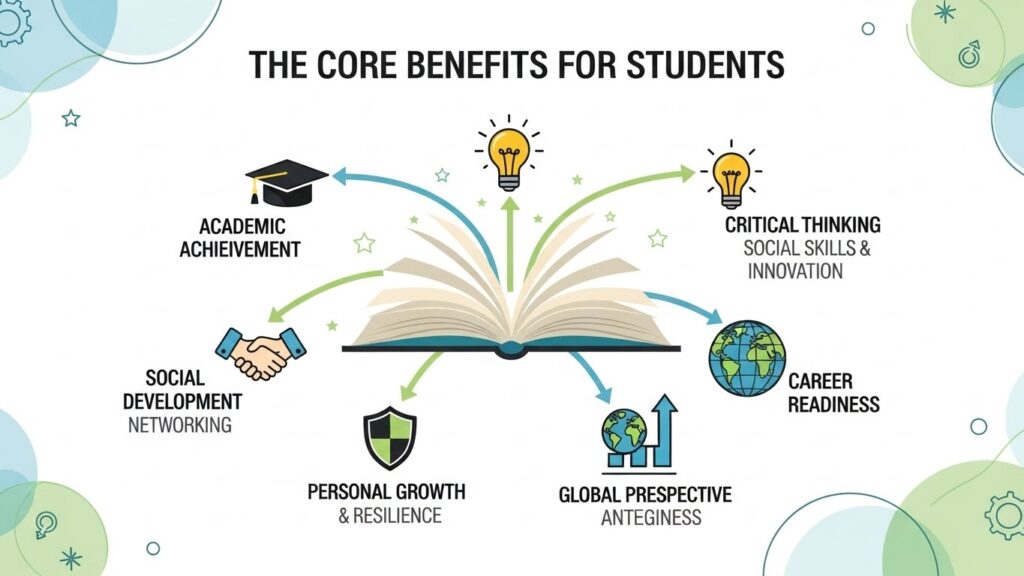Why More Students Are Studying in Africa in 2025
Why More Students Are Studying in Africa in 2025. Imagine this: A Nigerian student dreams of pursuing a degree in Computer Science abroad. For months, she applies to schools in the United States, the United Kingdom, and Canada. She works tirelessly on her essays, pays hefty application fees, and even secures partial funding. But then reality strikes. Visa denials, skyrocketing tuition, and a cost-of-living crisis in major Western cities make the dream less attainable than ever. She starts to wonder: Is studying abroad still worth it?
This is not an isolated story. In 2025, thousands of students around the world are facing similar challenges. Traditional study destinations are becoming more expensive, more competitive, and more restrictive. Rising tuition fees, inflation-driven living costs, and tougher immigration policies in countries like the UK, Canada, and Australia have created significant barriers for aspiring international students.
At the same time, a surprising trend is unfolding: more international and African students are choosing Africa as their study destination. Once overlooked in global higher education conversations, African universities are stepping into the spotlight with affordable tuition, scholarship opportunities, and programs aligned with rapidly growing local job markets. Cities like Cape Town, Nairobi, Kigali, and Accra are emerging as regional education hubs, attracting not only local students but also learners from across Africa, Asia, and even Europe.
Why This Matters in 2025
The timing of this shift is not coincidental. Several global and regional dynamics have converged:
- Cost of living crisis worldwide: Inflation has driven up the cost of accommodation, food, and healthcare in many Western cities, making studying abroad financially out of reach for middle-class families.
- Visa restrictions and immigration hurdles: Countries like the UK and Canada have tightened work-permit rules for international students, leaving many uncertain about career prospects after graduation.
- Africa’s rising universities: Institutions such as the University of Cape Town, the University of Nairobi, and the University of Ghana are improving global rankings, building research capacity, and partnering with international organizations.
- Continental investment in education: Governments and private foundations are investing heavily in higher education as a tool for economic growth, innovation, and youth empowerment.
The Central Promise
This article will explore why studying in Africa in 2025 is not just an alternative but a competitive, affordable, and rewarding option. It will unpack the data behind Africa’s rise, the benefits students can expect, the challenges that remain, and why now is the right moment to consider Africa as a study-abroad destination.
We’ll also balance the narrative. Africa’s higher education system is far from perfect; capacity challenges, infrastructure gaps, and recognition issues remain. Yet, the positive trends are strong enough to suggest a paradigm shift in global student mobility.
If you’re a student considering where to study next, or an educator curious about emerging trends, the message is clear: don’t overlook Africa. The continent is carving out a place in the global education landscape, and students who recognize this early may gain significant advantages.
The Shift: Why Africa Is Rising as a Study Destination

Over the last decade, global student mobility has largely centered around a familiar set of destinations: the United States, the United Kingdom, Canada, and Australia. These countries still attract millions of international students, but cracks are beginning to appear in their dominance. In 2025, a growing number of students — particularly from Africa, Asia, and the Middle East — are reconsidering their options and looking toward African universities as viable, even preferable, alternatives.
This shift isn’t about abandoning the dream of international education. Instead, it’s about rethinking what “studying abroad” actually means. Today, studying abroad doesn’t necessarily require moving to North America or Europe. It can mean crossing borders within Africa, tapping into regional hubs that combine affordability, cultural familiarity, and increasing global recognition.
Enrollment Growth Across Africa
The numbers tell an important story. Africa’s higher education sector has experienced one of the fastest enrollment growth rates globally, though it still lags behind other regions in terms of overall capacity. According to UNESCO and the World Bank, the gross enrollment ratio in sub-Saharan Africa nearly doubled between 2000 and 2020, and by 2025, projections show an even sharper rise.
This expansion is being driven by several factors:
- Demographics: Africa has the world’s youngest population, with over 60% under the age of 25. The sheer demand for higher education is pushing universities to expand and diversify their offerings.
- Government policies: Countries such as Kenya, Rwanda, and Ghana have made higher education reform a national priority, encouraging private institutions and public-private partnerships.
- Regional integration: Continental agreements like the African Continental Free Trade Area (AfCFTA) have made it easier for students to move across borders, boosting intra-African mobility.
As a result, Africa is no longer just exporting students — it’s retaining and attracting them.
Top African Universities Climbing Global Rankings

One of the biggest obstacles to choosing Africa in the past was perception. Many families assumed that local universities could not compete with Western institutions in quality or prestige. That narrative is changing.
- The University of Cape Town (UCT) in South Africa consistently ranks among the top 200 universities globally.
- The University of the Witwatersrand (Wits), also in South Africa, is recognized for its research in health sciences and engineering.
- The University of Nairobi (Kenya) and the University of Ghana have expanded international partnerships, hosting exchange programs with institutions in Europe, Asia, and North America.
- Newer institutions like the African Leadership University (ALU) in Rwanda are experimenting with innovative models, combining global teaching practices with African-centered curricula.
The rise of these universities is not only boosting Africa’s visibility but also signaling to students that staying on the continent can yield credentials that carry weight internationally.
Intra-African Mobility: Why Students Are Studying Closer to Home
A key part of this shift is intra-African student mobility. More students are crossing borders within the continent for higher education — for example, Nigerians choosing Ghana, Kenyans choosing South Africa, or Rwandans studying in Uganda.
Why is this trend accelerating?
- Lower total cost: Tuition and living expenses are typically far cheaper than in Europe or North America.
- Cultural and linguistic alignment: Shared languages (English, French, Arabic, Portuguese, Swahili) make transitions smoother.
- Fewer visa barriers: Regional agreements often make it easier to secure student visas or permits within Africa.
- Relevance to local job markets: Students see value in studying in countries where they may later want to work or start businesses.
For many, this isn’t a compromise but a strategic choice. It provides the international exposure of studying abroad while maintaining proximity to home and affordability.
The Big Picture
When you step back, the shift toward Africa as a study destination is both practical and aspirational. On the practical side, students are reacting to global barriers like cost and immigration restrictions. On the aspirational side, they are increasingly drawn to the idea of shaping Africa’s future from within, studying at institutions that are becoming regional leaders in research, innovation, and entrepreneurship.
Africa’s story in 2025 is no longer just one of “brain drain.” It’s a story of brain circulation — where students move within and across the continent, bringing back skills, ideas, and connections that fuel growth.
The Core Benefits for Students

Choosing to study in Africa in 2025 comes with a range of benefits that go far beyond affordability. For students navigating the complex world of higher education, African universities are offering practical advantages, academic quality, and social relevance that are often overlooked in global conversations about study abroad.
Affordable Tuition and Living Costs
One of the most immediate and tangible benefits is cost. Tuition fees at African universities are significantly lower than those in traditional Western study destinations. For example:
- In South Africa, public universities charge between $3,000 and $8,000 per year for international students, compared to $25,000–$50,000 in the US.
- In Ghana and Kenya, fees for many programs are even lower, averaging $2,000–$5,000 per year, depending on the institution and program of study.
Living costs are similarly manageable. Cities like Kigali, Accra, and Nairobi offer affordable accommodation, transportation, and food. Students can live comfortably on $300–$600 per month, a fraction of what it costs in London, Toronto, or Sydney.
This combination of lower tuition and manageable living costs makes Africa an attractive option for students who want high-quality education without incurring massive debt.
Scholarship Opportunities That Change Lives
Beyond affordability, Africa is seeing an explosion of scholarship programs aimed at both local and international students. Organizations and foundations are investing heavily in making education accessible:
- Mastercard Foundation Scholars Program: Supports students across Africa and beyond, covering tuition, living expenses, and mentorship opportunities.
- Mo Ibrahim Foundation Scholarships: Focused on leadership and governance studies, enabling students to pursue degrees at top African universities.
- Government-sponsored initiatives: Countries like Rwanda and Ghana offer competitive scholarships for African students pursuing regional mobility.
These scholarships not only reduce financial pressure but also provide mentorship, networking, and internship opportunities that enhance career prospects.
Programs That Match Africa’s Job Market
A major advantage of studying in Africa is the alignment of degree programs with local and regional economic trends. Many universities are tailoring curricula to meet the demands of growing industries:
- Technology and innovation: Kenya’s “Silicon Savannah” and Nigeria’s fintech hubs offer students access to tech programs and startup ecosystems.
- Healthcare and public health: South African and Ghanaian universities are expanding medical and public health programs to address local healthcare challenges.
- Renewable energy and sustainability: Universities in Morocco, Egypt, and South Africa are investing in programs that respond to Africa’s green energy transition.
By studying in Africa, students gain skills and knowledge directly relevant to the continent’s evolving economy, giving them a competitive edge in local, regional, and even international job markets.
Cultural Relevance and Stronger Networks
Studying closer to home also brings social and cultural advantages. Students experience less culture shock, maintain family and community connections, and build professional networks that can last a lifetime.
- Many programs integrate local case studies, languages, and regional practices, providing a deeper understanding of the continent.
- Student networks: Universities increasingly foster clubs, mentorships, and alumni connections that bridge African countries, helping students access internships, collaborations, and job opportunities across borders.
Cultural relevance and strong networks often make the transition from university to career smoother than if students were studying abroad in a distant country where they have limited connections.
Student Success Stories
- Aisha from Nigeria: Chose to study Data Science at the University of Ghana. With a Mastercard Foundation Scholarship, she completed an internship with a fintech startup in Accra and is now launching her own AI-driven analytics firm.
- Samuel from Kenya: Pursued Environmental Engineering in Rwanda. The program’s focus on sustainable energy allowed him to work on a solar microgrid project in Kigali before graduation.
- Fatima from Egypt: Studied Public Health in South Africa and collaborated with local NGOs to design community health programs. She leveraged her network to secure a position with the World Health Organization in Nairobi.
These examples illustrate that studying in Africa can provide practical skills, global opportunities, and impactful career trajectories — all within a context that is affordable and socially relevant.
Summary
The core benefits for students studying in Africa in 2025 are clear: affordable tuition and living costs, scholarship opportunities, programs aligned with the job market, and culturally relevant education that strengthens networks. Together, these advantages make African universities not just an alternative, but in many cases a strategic choice for students seeking value, opportunity, and impact.
Challenges to Consider (Balanced Perspective)
While studying in Africa offers numerous advantages, it is important for prospective students to understand the challenges they may encounter. Recognizing these factors ensures that students can plan effectively, make informed decisions, and maximize their experience.
Capacity and Infrastructure Gaps
One of the most significant challenges in African higher education is capacity constraints. Despite growing enrollment, universities still struggle to accommodate all qualified applicants:
- Many public universities face overcrowded classrooms and limited housing options, especially in major cities like Nairobi, Lagos, and Accra.
- Laboratory facilities, research centers, and libraries may not be as expansive as those in Western universities. For example, while South Africa has world-class labs at UCT or Wits, smaller universities may lack access to advanced equipment.
- Online and hybrid learning infrastructure, though improving, is not yet uniformly reliable across the continent, which can impact access for remote students.
These gaps do not make African education inadequate; rather, they require students to plan ahead, explore alternative campuses, or choose programs known for robust facilities.
Recognition of Degrees Abroad
Another consideration is international recognition. Although top African universities are gaining global visibility, some employers or foreign graduate programs may still prefer Western credentials, particularly in highly competitive fields:
- Students aiming for PhDs in certain countries may need to ensure their African degrees are accredited and recognized internationally.
- Professional licensing (e.g., law, medicine, engineering) may have additional requirements if graduates plan to practice outside Africa.
That said, this challenge is shrinking over time. Partnerships between African universities and global institutions, along with improvements in rankings and research output, are increasingly validating African degrees worldwide.
Funding and Research Constraints
Although scholarships are expanding, funding limitations remain a reality for some programs:
- Research grants may be smaller than in the US or Europe, which can affect students pursuing highly specialized or experimental projects.
- Funding for international student support services — counseling, career guidance, and extracurricular programs — is improving but varies widely by institution.
Students can mitigate this by applying for regional scholarships, seeking internships, or choosing universities with strong research partnerships with international institutions.
Navigating Cultural and Social Adjustments
Even within Africa, cultural adaptation can be a factor:
- Students moving across countries may encounter new languages, dietary habits, and social norms. For instance, a Francophone student in West Africa may need to navigate Anglophone academic systems.
- Urban centers in Africa are diverse, but safety, transportation, and healthcare access can differ significantly depending on location.
By researching campuses, engaging with student networks, and connecting with alumni, students can smooth the adjustment process and make their experience more rewarding.
Balancing Benefits and Challenges
It’s crucial to frame these challenges as considerations rather than deal-breakers. African universities continue to grow in capacity, infrastructure, and recognition, while the core benefits — affordability, scholarship access, career alignment, and cultural relevance — remain compelling.
In fact, addressing these challenges proactively can turn them into advantages: students who prepare, choose the right programs, and tap into local networks often experience more practical learning and deeper engagement than in more crowded, impersonal systems abroad.
Summary
The key challenges of studying in Africa include capacity limitations, degree recognition issues, funding constraints, and cultural adjustments. While these factors require careful planning, they do not outweigh the financial, educational, and career advantages available to students. For those willing to navigate these challenges strategically, African universities offer a high-value, globally relevant education that is increasingly competitive with traditional Western destinations.
Call to Adventure (Conclusion + CTA)
By 2025, Africa is no longer simply a source of students seeking opportunities abroad — it is emerging as a destination in its own right. Across the continent, universities are expanding capacity, raising their global profiles, and offering programs that align directly with the needs of growing local economies. For students, this shift represents not just a practical choice but a strategic opportunity to gain high-quality education while staying connected to the continent.
Africa: A New Frontier for Students
Several forces make studying in Africa increasingly attractive:
- Scholarships and financial support: Programs like the Mastercard Foundation Scholars Program and government-backed scholarships reduce financial barriers and provide mentorship and career development.
- Programs aligned with local industries: Universities are responding to Africa’s growing tech hubs, renewable energy projects, public health needs, and entrepreneurial ecosystems. Graduates leave not only with degrees but with practical skills tailored for high-demand fields.
- Cultural and social networks: Studying within Africa provides students with meaningful connections, language advantages, and cultural familiarity that facilitate both personal and professional growth.
- Global recognition improving rapidly: Top African universities are climbing international rankings and forming partnerships with renowned global institutions, ensuring degrees are increasingly respected worldwide.
These elements together create an environment where studying in Africa is both accessible and strategically advantageous. Students gain education that is relevant, practical, and increasingly competitive on the global stage.
Looking Ahead: 2025 and Beyond
The shift toward Africa as a study destination is not a temporary trend. It reflects broader economic, demographic, and educational changes:
- Demographics: Africa has the youngest population in the world, creating unprecedented demand for higher education.
- Investment in education: Both governments and private institutions are committing significant resources to research, technology, and campus infrastructure.
- Regional mobility: Agreements within Africa are making it easier for students to move across borders, expand networks, and access quality programs without leaving the continent.
For international and African students alike, this is a unique moment to consider Africa seriously as a study-abroad destination. Those who seize this opportunity can combine affordability, career alignment, and a culturally rich educational experience — all while contributing to the continent’s future.
Call to Action
For students exploring their options in 2025, Africa is ready to be discovered. Here are practical steps to take:
- Explore scholarships and financial aid
- Look into programs such as the Mastercard Foundation Scholars Program, government-sponsored scholarships, and university-specific funding opportunities.
- Research top universities and programs
- Consider universities in South Africa, Ghana, Kenya, Rwanda, Morocco, and Egypt. Look for programs that match your career goals and skill interests.
- Compare tuition and living costs
- Factor in affordability, local living conditions, and campus facilities to ensure a practical decision.
- Connect with current students and alumni
- Join online communities, forums, and social media groups to gain firsthand insights and advice.
- Plan for cultural and academic adjustment
- Understand language requirements, social norms, and campus life to make your transition smoother and more enriching.
By taking these steps, students can make informed, strategic decisions and position themselves to benefit from the rise of Africa as a global study destination.
Final Thought
Africa in 2025 represents more than an alternative to Western education — it is a vibrant, evolving hub for academic, professional, and personal growth. For students seeking a high-value, culturally relevant, and globally recognized education, the continent offers opportunity, affordability, and adventure. The message is clear: the future of studying abroad is not just overseas — it’s also south of the Sahara.


